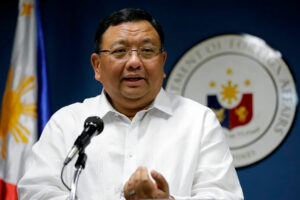THE GOVERNMENT needs to engage more with industry representatives to better tailor policy to their specific needs in the context of complex global economic forces, former Foreign Affairs Secretary Jose Rene D. Almendras said.
In a speech after receiving the Arangkada Lifetime Achievement Award, Mr. Almendras called the outcome of this custom-fit approach “micro-policies, which he said were needed in light of unique challenges confronted by every sector.
“Policy can no longer be simply or generally macro, but more now than ever, micro,” Mr. Almendras said
“Competitors must come together as industry groups to study, develop, and strategize and advocate for their specific industries,” he added, noting that the environment is now shaped by what he called “geoeconomics.”
He said the government should also adjust its policymaking perspectives to reflect micro-policy considerations.
“Many countries and their leaders have invited private sector groups to be active participants in policy discussions, strategy formulation, and decisions,” he said, noting that one of the advanced countries already has a playbook for each major industry that considers geoeconomics.
He said such a playbook anticipates the impact on each industry of actions taken by other countries and sets down possible responses.
“The recent shifts and trends, now referred to as the new age of geoeconomics, pose a more complex challenge,” he said.
He said that geoeconomics “is the use of economic tools and power by a state to achieve strategic geopolitical or economic goals, often by leveraging trade, finance, and investments to influence or coerce other countries.”
He cited the need to accelerate all the pending free trade agreements (FTAs) .
“Bilateral relationships now seem to take precedence over multilateral relationships. Nation-to-nation, economy-to-economy discussions, and thus, negotiations, have become the norm,” he said.
“FTAs are now more important than ever. My wish is we accelerate all the pending FTAs that we, the Philippines, have with many, many countries,” he added.
Mr. Almendras said countries need to be more nimble and adjust quickly and effectively to change.
“This highlights the need for constant and active engagement by all stakeholders, including the government. This is not a one-meeting, one-discussion situation. This requires constant and active engagement,” he said.
“By having a regular set of meetings on a regular basis, it will enable us to monitor, keep abreast, and be proactive if and when possible,” he added. — Justine Irish D. Tabile

